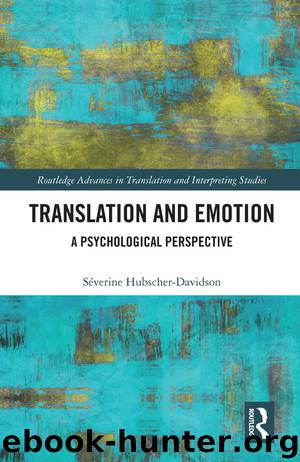Translation and Emotion by Hubscher-Davidson Séverine

Author:Hubscher-Davidson, Séverine.
Language: eng
Format: epub
Publisher: Taylor & Francis (CAM)
Published: 2017-10-09T16:00:00+00:00
Emotion Regulation and Trait EI
As we have seen, individuals can vary tremendously in their ability to implement regulation strategies. Being able to regulate emotions is a component part of emotional intelligence. As shown in Chapter 1, in the trait EI model, emotion-related self-perceptions form four interrelated factors. The focus in this chapter is more specifically on the factor where emotion regulation is involved, that is, self-control, which relates to traits pertaining to the regulation of emotions and impulses (Petrides 2009, 12). According to Mikolajczak et al. (2008b; 2009), several studies have shown that trait EI is particularly useful for capturing individual differences in emotion regulation, which is one of the reasons why the trait EI construct was used in the present study.
Emotion regulation is said to rely on the same mental resources as other forms of self-control (EROS Research Group 2013). In their study of the relationship between trait EI and stress, Mikolajczak, Luminet, and Menil (2006, 86) confirm that the TEIQue factor of self-control captures both stress management and emotion regulation aptitudes, and that this self-reported measure has content validity. Ożańska-Ponikwia (2013, 47) reports that high scorers on the self-control factor have “a healthy degree of control over their urges and desires. In addition to fending off impulses, they are good at regulating pressures and stress”. In the TEIQue technical manual, the emotion regulation facet of self-control is described as follows:
This scale measures short-, medium-, and long-term control of one’s own feelings and emotional states. High scorers have control over their emotions and can change unpleasant moods or prolong pleasant moods through personal insight and effort. They are psychologically stable and they know how to pick themselves up after emotional setbacks. Low scorers are subject to emotional seizures and periods of prolonged anxiety or even depression. They find it difficult to deal with their feelings and are often moody and irritable. This facet correlates negatively with neuroticism and paranoid personality and positively with adaptive coping styles, and conventional careers.
(Petrides 2009, 59–60)
Download
This site does not store any files on its server. We only index and link to content provided by other sites. Please contact the content providers to delete copyright contents if any and email us, we'll remove relevant links or contents immediately.
| Anthropology | Archaeology |
| Philosophy | Politics & Government |
| Social Sciences | Sociology |
| Women's Studies |
Cecilia; Or, Memoirs of an Heiress — Volume 1 by Fanny Burney(32536)
Cecilia; Or, Memoirs of an Heiress — Volume 2 by Fanny Burney(31933)
Cecilia; Or, Memoirs of an Heiress — Volume 3 by Fanny Burney(31925)
The Great Music City by Andrea Baker(31908)
We're Going to Need More Wine by Gabrielle Union(19028)
All the Missing Girls by Megan Miranda(15915)
Pimp by Iceberg Slim(14476)
Bombshells: Glamour Girls of a Lifetime by Sullivan Steve(14046)
For the Love of Europe by Rick Steves(13846)
Talking to Strangers by Malcolm Gladwell(13339)
Norse Mythology by Gaiman Neil(13331)
Fifty Shades Freed by E L James(13227)
Mindhunter: Inside the FBI's Elite Serial Crime Unit by John E. Douglas & Mark Olshaker(9310)
Crazy Rich Asians by Kevin Kwan(9271)
The Lost Art of Listening by Michael P. Nichols(7485)
Enlightenment Now: The Case for Reason, Science, Humanism, and Progress by Steven Pinker(7303)
The Four Agreements by Don Miguel Ruiz(6735)
Bad Blood by John Carreyrou(6608)
Weapons of Math Destruction by Cathy O'Neil(6257)
